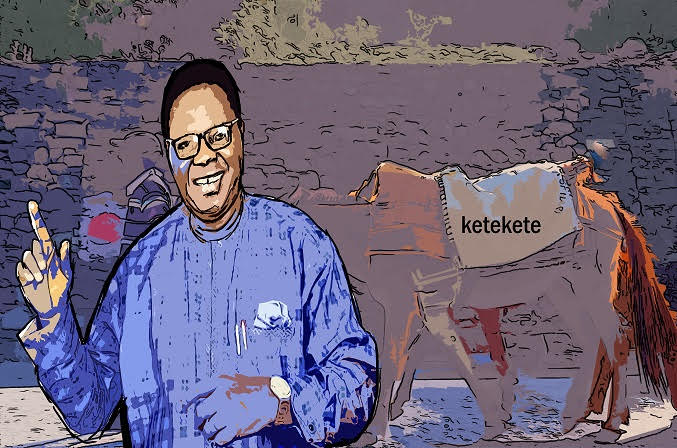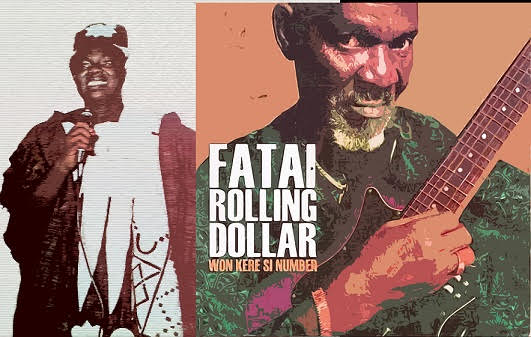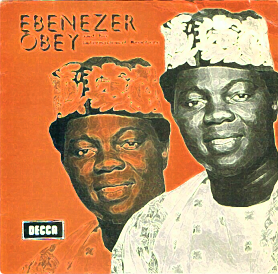PART 1
Ebenezer Obey-Fabiyi: The Commander of Music, The Evangelist of Morals, and The Professor of Culture
By Toyin Falola

Chief Ebenezer Obey-Fabiyi, whose name rings a bell in the Nigerian Juju music industry, is a veteran with great participatory culture in his contribution to the country’s political development through his music. In 1942, Obey, as popularly known, was gifted to the family of Obey-Fabiyi, a family unit in Owu, an Egba sub-ethnic group in Yorubaland. During his birth, the Egba people were well-exposed and belonged to the community of Yoruba people who understood the value of Western education. Obey, therefore, had no social challenges in pursuing academic engagement as a part of artistic excellence. Going to school was all that was needed to usher his steps to the right path in his future endeavor.
Anyone familiar with the musical productions of the living legend would have no problem associating him with great Africans who have used their platform to promote excellence and the ignition of a shared passion or agenda. Obey was, and still is, popular in the Nigerian Juju music industry not only because he was one of the few available during the trying period, but also because his music reflects societal issues and usually provoke reactions. Yoruba social rules demand consistency from individuals who want to remain outstanding with cutting edge achievement in their social and political engagements, and Obey has adhered to these rules. He has been consistent; a committed artist who took on the responsibility of promoting values through his music.

The place of Lagos in the making of Obey can be likened to Athens, where the greatness of a number of Romans was molded. In the mid-1950s, the political significance of Lagos was undeniable, so any Nigerian who wanted to connect deeply with the masses would first consider breaking into Lagos’ ever-expanding space. Ebenezer was foresighted, and his realization that Lagos would project his career to the desired audience compelled him to relocate to the state of excellence. After some time, he began to build a patronage network and useful connections with people who had the power to better influence his career. Being someone aware of the centrality of education to his trade, he enrolled under the popular Alhaji Fatai Rolling-Dollar’s band, where he learned the art of music and how to negotiate his goals within the socioeconomic configurations of the society. Having learned the ropes, he decided to give his music career a befitting trajectory by organizing “The International Brothers” in 1964. The band, which became the projector of his music production and performance, served to forge an unbreakable bond between him and his legion of admirers, spreading his fanbase across the world.
Obey is a philosopher and an ardent researcher whose scope of research is informed by his audience and their geographical reach. Once he realizes that he needs to incorporate an idea into his music, he does not waste time in introducing exciting concepts that will effectively promote and deliver his artistry. His observation of social activities led him to immediately redefine a group which, as at the early period of the 1970s, was transformed into the “Inter Reformers.” In every way, the group became exponentially successful partly because they introduced an indigenous flavor to their songs, which immediately caught the public’s attention. Their indigenous appeal gave room for more acceptability among the Yoruba at home and, more importantly, among those in the diaspora. Obey is eclectic with his art. He chooses to combine different systems not because he cannot define his artistry, but because he is gifted in these different areas, and he would not hide his intellectual ability. By adding more drum kits, guitars, and talking drums to his music, he became very popular with the masses. He has been doing great in his career, and he is a forceful voice in the entertainment industry and social life because he uses his skill to promote social affairs.
Obey can be understood within the context of his social engagement through music. One good way to portray his image is to expose what he does with his music productions. As a conscience of the society, a poet or a musician occupies a central position of social advancement by preserving cultural traditions and human history within the textual archives that can be retrieved by future generations. Through the process of storing the historical information of a society, they open up the possibility of intellectual engagement with the past so that people would find an effective way of moving forward to avoid similar experience or the consuming challenges of the past. There are several of Obey’s songs, for example, that highlight the sociopolitical currency of the country at the time of production.
Upon evaluation and critical engagement, we understand that the postcolonial Nigerian environment has seen a consortium of tragic experiences caused by the narcissistic style of Nigerian political leadership and with a heartrending outcome for the common individuals. Obey’s “Ohun Oju ri L’aiye,” x-rays the postcolonial decadence displayed by the elite in the management of the commonwealth. He alludes to their wastefulness and the sheer lack of foresight as the original foundation for the woes and travails that the average Nigerians faced. He reiterates that by excessively siphoning the commonwealth for provincial and personal agendas, the lack of economic redistribution exposes the people to greater economic risk, and they suffer from poor administrative or weak leadership commitment. The song, which translates to “What the eyes have seen,” seeks to give the audience a crystal-clear picture of what the Nigerian society represents in the period after the country’s much-anticipated independence.
Ebenezer Obey decries the political insincerity that prevails during the period as the central reason for the emasculation of the Nigerian masses’ economic strength. Therefore, the average individual has trouble accessing wealth that can be used to transform their lives, and due to this inability, they suffer beyond what could be imagined. The song is a metaphor for the incapable political elites who thought that independence was all that was needed to drive the country to the next phase. Beyond the agitation for self-determination, every progressive civilization must have a clear picture of what the future might look like, as well as the zeal to follow their plans with actions and seriousness. In Nigeria’s case, however, the 1950s and the 1960s were periods of political interregnum caused by incurable kleptomanias in power.
The country’s political situations continue to move in diverse directions, making it impractical to maintain a national focus. The instability in the philosophy used by leaders can bring about some social challenges or pressure on the governed, and because the Nigerian populace has undergone a series of disproportionate social struggles that have violated their innocence and exposed them to conflicting experiences, the masses have been forced to make do with any available crumb released by the political class. Meanwhile, the political class, the elites and those who enjoy the advantages of the bourgeois class, live large at the expense of the helpless masses. This does not only reflect in their materialist culture, but it has also permeated their moral architecture, and they have displayed a socially unacceptable moral culture. They pursue financial success to the detriment of their subjects, ignoring the fact that society often succeeds in rearranging events and activities. Thus, in 1968, Obey released another beautiful track titled, “Ore Mi E Se Pelepele,” literally translatable to “Dear friend, be diplomatic” [https://www.youtube.com/watch?v=F30zG4i-y5U]. It is moral advice to people who have chosen to intimidate others because they have risen to a higher position on the financial ladder. Obviously, through songs like this, Ebenezer Obey and many other professionals re-engineer society through their creative renditions.
In most cases, musical artists are agents of peace and this springs from the fact that they have social acceptance that is only comparable to that of the political leaders. In fact, their influence can be argued to be greater than politicians’ because once the political leaders exit the corridor of power, except if they are exceptionally successful in their leadership, the masses have a strong delete button that they press in their memory. And upon the activation of this key, the social importance of the politicians evaporate immediately. However, this is not the case with musicians, for obvious reasons. With their songs and productions, they have the ability to reignite the masses’ feelings in a different age from the actual time of production because each generation is likely to get a different meaning to an artist works, depending on the prevailing social attitudes of the time.

To not lose sight of our focus, Ebenezer Obey once facilitated the promotion of peace among warring individuals in the Yoruba society. And because he recorded something that can be related to the current time, his ability to project into the future has helped in using his songs to settle disputes in some situations. In 1971, Obey produced “Ija Pari,” meaning “dispute is settled,” to show the finality of the infraction between two opposing groups, one of which he was a member. The song was to quell the escalation of the conflict (https://www.youtube.com/watch?v=wq34P00XVlM) between him and another popular Afro-juju artiste, King Sunny Ade. These two are eminent personalities in the juju music industry and also in the Yoruba cultural environment. However, the inevitability of contradictions always leave room for clashes between groups and individuals, and when these conflicts arise, they polarize the society and make peace difficult to attain. Developments of every kind—social, cultural, political, and others—become practically impossible when there is no peace.
In essence, the effect that these two icons could have on the social architecture of the Yoruba society cannot be ignored. As a result, it was important that there were efforts to bring about peace between them, even though it was clear that their different fan bases were happy about the conflict’s progression. From Obey’s disposition to the controversy, we know that he is a peaceful person who is open to dialogue. Beyond the philosophical significance of his song, “Ija Pari” encourages peaceful coexistence in the society and emphasizes the need for mutual respect, dialogue, and inclusive development agenda in the course of moving forward as a people.
Ebenezer Obey represents many things to the Yoruba people and culture as a whole. He is a preeminent cultural ambassador as well as a conflict resolution icon. The Yoruba culture is rich in moral and ideological values, and the fact that a lot of intellectuals and artistes exhibit the traits of that culture corroborates this argument. On many occasions, Obey has been involved in the promotion of Yoruba cultural traditions through his music. By actively evaluating the moral aspects of the Yoruba people, he relies on their oral history to recreate their present time in one of his classics, “Miliki” https://www.youtube.com/watch?v=vT4osfiw4Fk
He stresses the philosophical position of the Yoruba, who believe that life progresses because humans are faced with a barrage of challenges. And because there are challenges, humans develop their intellect to find ways to contain the challenges and travails of the society. Therefore, as humans negotiate their way through life, they would be disturbed by making some significant decisions that would affect their lives. Obey uses his songs to promote the relevance of Juju music artistes, creating social awareness about them, and advancing their participation in encouraging moral principles and values in the society. He also cautions against being distracted by humans in the course of an individual’s life journey.
Even when there are compelling reasons to follow the lines drawn by the society so that the trajectory of moral and spiritual understanding would be maintained, humans must be able to use their discretion when listening to advice from individuals whose moral behavior is questionable. In other words, one cannot continue to listen to everyone’s advice because human advice would be as diverse as their experiences. This opens the possibility of clashes between ideas and philosophies. When people get to this point, they will never be able to avert the different forms of conflict engendered by listening to many voices. In “Baba Oniketekete”
Obey uses the narrative of an elderly person who set out on a journey with his child, using their horse as the mode of transportation. Each time the man decides who is in the best position to sit on the horse during the ride, he is exposed to aggressive criticisms from people who would rather condemn his decisions without understanding his reasons. Listening to successive advice from humans drained him and almost made him lose his sanity. Through this masterpiece, Obey warns that while it is important to listen to people’s advice and admonitions, it is foolish to allow them to prevail in one’s life decisions. People will judge one’s actions and decisions without making efforts to understand the reasons behind those actions.
On the same album, Obey produced another track, “Aiye Laba Ohun Gbogbo,” which means “things of nature precede man.” Understanding this, the Yoruba people develop a working philosophy that checks their actions as humans. The import of that philosophy is twofold. On the one hand, humans are enjoined to be circumspect in their attitude to life and their behavior towards others. Since humans know that everything in nature comes before them, they would be guided on their moral perception of life. Nature’s gifts are, therefore, meant to be enjoyed and valued accordingly. People must desist from individualism that places one person above others. When people behave this way, they violate others’ rights by denying them access to the basic necessities of life. On the other hand, however, humans would leave everything behind, regardless of how popular, powerful, or significant they are to the society. Essentially, this philosophy preaches diplomacy, circumspection, and caution to people who are taken away by the euphoria of material possessions. Moreover, in doing so, it encourages people not to spare opportunities to enjoy their life when they have the chance because human existence is transient. These are the ways through which the society instils the moral beliefs of the community into the younger generations.
Obey set the bar in entertainment. He is so adored that almost everyone, regardless of their cultural belief, accepts him and sees him as their icon. He is a force to be reckoned with behind the microphone. Obey performs his songs with a level of ease that one cannot easily find among other entertainers. He makes people dance, no doubt, and beyond this, he leaves a strong imprint of his ideas into them. In “No Place Like my Country” [https://www.youtube.com/watch?v=djfFm02BDz0], he combines his philosophical dexterity with entertainment excellence. The track was released during the time of postcolonial tensions when individuals refused to see the convincing reasons why the colonial government and system gave independence to the erstwhile colonies in the first place. The level of betrayal of the political class generated a feeling of detachment and nostalgia for the country during this period.

To prevent this situation from spiraling out of control, a social mobilizer like Obey has the social responsibility to douse people’s tension and give them hope. The concept of promoting Nigeria underscores the importance of providing people with hope so that they can have focused attention on the development of their country. By singing the country’s praise, even when the political class was extravagant and wasteful, he tells Nigerians that they have a future to look forward to, different from what the political representatives provide.
Almost a decade later, precisely in 1984, Obey released another song titled “The Only Condition to Save Nigeria”, where he diagnosed the country and gave detailed accounts of how it was speeding in a wrong direction. This means that the music artiste is aware of the country’s challenges when he earlier sang about its resplendent condition. But because he has a duty towards society, he rises to the occasion whenever it needs his voice and contributions.
Without forgetting that he is highly determined to achieve all of these, Obey is an icon of excellence who has transported the Yoruba culture beyond its geographical boundaries. He is one person who will not be forgotten in the annals of history because he has made significant contributions to the advancement of the Yoruba world and African music. Through his music, he has facilitated a peace accord and enhanced the promotion of dialogue to resolve controversies that have destructive potential.
Ebenezer Obey-Fabiyi (aka Commander) is a loving father, a successful businessman, an influential figure in the Nigerian community, and a global musical icon. He is an extraordinary entertainer, seasoned sociologist (achieved through his interrogation of the social happenings), a moral figure, and an instrument of change. His music continues to reflect the timeless sociocultural and sociopolitical issues of our time. For the immense contributions he has made to the advancement of humanity and the preservation of oral culture, it is not out of line to celebrate his ingenuity.
*Please join us for a conversation with Chief Commander Ebenezer Obey-Fabiyi onSunday, April 18, 2021
5:00 PM (Nigeria)
4:00 PM (GMT)
11:00 AM Austin (CST)
Register and Watch At:
https://www.tfinterviews.com/post/chief-obey


